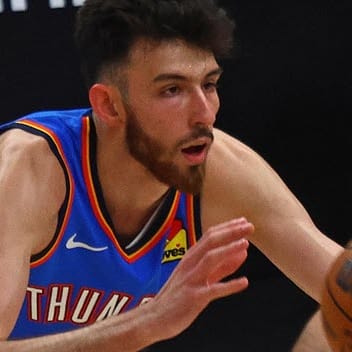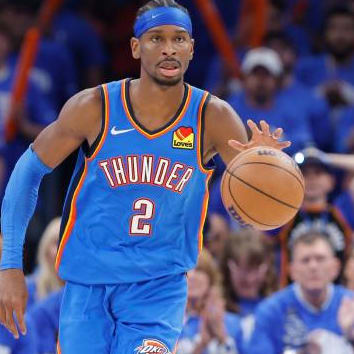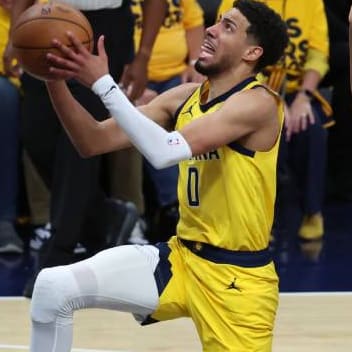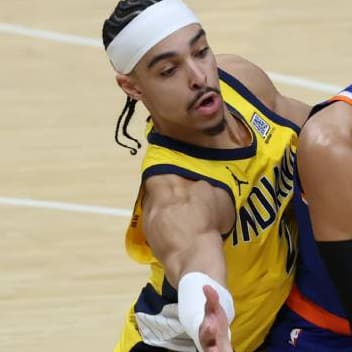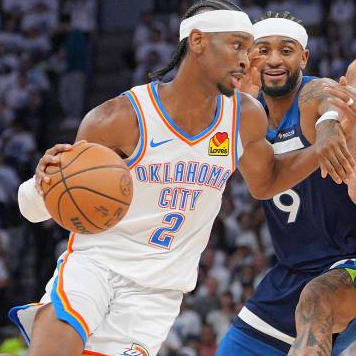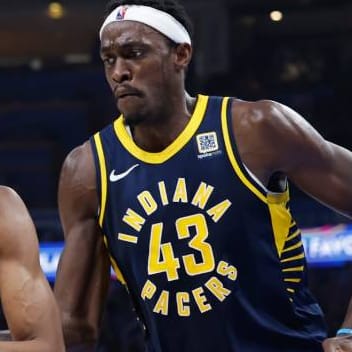This article is part of our The Prospect Post series.
Have you ever looked at fantasy projections and wondered where those numbers come from? Do fantasy sites employ some fantasy version of the Rain Man (this one, not this one) to come up with these projections? Is there a supercomputer somewhere that allows you to feed information into one end and have fantasy projections come out of the other end?
Somehow these projections exist, and it turns out that they are also remarkably accurate, particularly for fantasy basketball. Check out the preseason projections for LeBron James published by RotoWire, ESPN and CBS compared with his actual 2013-14 stats:
Preseason Projections - LeBron James | FG% | FT% | 3PM | REB | AST | STL | BLK | PTS |
56.5% | 75.2% | 1.4 | 8.0 | 7.2 | 1.7 | 0.9 | 26.8 | |
54.9% | 75.9% | 1.3 | 7.9 | 6.9 | 1.8 | 0.8 | 27.1 | |
55.0% | 77.3% | 1.2 | 8.3 | 7.2 | 1.7 | 0.8 | 26.7 | |
56.7% | 75.0% | 1.5 | 6.9 | 6.3 | 1.6 | 0.3 | 27.1 |
Each site came very close to projecting LeBron's actual stats in nearly every category. So, where do these projections come from, and why are they all so accurate?
The truth is that NBA players produce fantasy stats at an incredibly consistent rate per possession over the course of an entire NBA season. This is part of the reason that top picks in NBA fantasy auctions are worth so much more than they are in Football or Baseball. For example, look at LeBron's fantasy averages per 100 possessions (courtesy of basketball-reference) for the past four seasons:
James - Per 100 Possessions | MPG | FG% | FT% | 3PM | REB | AST | STL | BLK | PTS |
2010-2011 | 38.8 | 51.0% | 75.9% | 1.6 | 10.2 | 9.6 | 2.1 | 0.9 | 36.4 |
2011-2012 | 37.5 | 53.1% | 77.1% | 1.2 | 11.1 | 8.8 | 2.6 | 1.1 | 38.1 |
2012-2013 | 37.9 | 56.5% | 75.3% | 1.9 | 11.2 | 10.1 | 2.4 | 1.2 | 37.5 |
2013-2014 | 37.7 | 56.7% | 75.0% | 2.1 | 9.7 | 8.8 | 2.2 | 0.5 | 37.9 |
Average | 38.0 | 54.3% | 75.8% | 1.7 | 10.5 | 9.4 | 2.3 | 0.9 | 37.4 |
Granted there are a few unexpected results (e.g. LeBron's blocks dropping in half this season), but generally speaking, when you are in the business of predicting the future, this data is incredibly reliable and consistent. If you were asked to project LeBron's stats for next season (per 100 possessions), wouldn't you come up with something that looks like this, just by eyeballing the table above:
James - Per 100 Possessions | MPG | FG% | FT% | 3PM | REB | AST | STL | BLK | PTS |
2014-15 Proj. | 37.5 | 56.6% | 75.2% | 2.0 | 10.0 | 9.0 | 2.3 | 0.5 | 37.7 |
From there, if we adjust for the pace the Heat play (the Heat average about 91 possessions per game) and the minutes LeBron will likely play (lets say 37.5 minutes per game), LeBron should play about 71 possessions per game next season, and his projections would look roughly like this:
James - Per 100 Possessions | MPG | FG% | FT% | 3PM | REB | AST | STL | BLK | PTS |
2014-15 Proj. | 37.5 | 56.6% | 75.2% | 1.4 | 7.1 | 6.4 | 1.6 | 0.4 | 26.8 |
Unless there are significant changes that affect LeBron's playing time next season, his stat line at the end of next season will probably look very similar to the numbers I've shown above. The only flaw with this type of projection is that every year there are a few fantasy relevant players that have no previous seasons to base their projections on: the rookies.
Projecting Rookie Stats
Within each fantasy site, you will see projections for rookies sprinkled in with projections for veterans. The difference is that projections for rookies have no previous NBA seasons to base the projection on. These projections are also not nearly as agreeable from site to site. Check out the preseason projections for Rookie of the Year Michael Carter-WIlliams from the same three sites:
Preseason Projections - Carter-Williams | FG% | FT% | 3PM | REB | AST | STL | BLK | PTS |
ESPN | 39.6% | 71.7% | 1.2 | 2.9 | 6.2 | 1.2 | 0.3 | 12.0 |
CBS | 39.2% | 71.1% | 0.8 | 3.9 | 5.9 | 2.0 | 0.4 | 9.7 |
RotoWire | 40.9% | 68.9% | 0.4 | 4.7 | 6.1 | 1.7 | 0.5 | 10.0 |
Actual 2013-14 Stats | 40.5% | 70.3% | 0.8 | 6.2 | 6.3 | 1.9 | 0.6 | 16.7 |
Clearly, the industry underestimated what Cater-Williams was capable of in his first season, but there also wasn't a consensus among sites about what to expect from him in the preseason. ESPN projected him to make three times as many three pointers as RotoWire did. RotoWire projected him to have almost twice as many rebounds as ESPN did. The question is why are these projections so different? Was one projection based on college stats and the other based on a comparable player's rookie season? Was one trying to be optimistic while the other was trying to be more conservative?
I don't have an issue with these projections underestimating Carter-Williams' fantasy season. We are talking about predicting the future, which is very difficult, particularly without any reliable data to base your decisions on. The issue I have with these projections is that we have no information about where they came from and how they were developed. This uncertainty and inconsistency makes it difficult to know what to do with these players on fantasy draft day.
When it comes to valuing rookies in your fantasy draft, I believe it would be more helpful to have a few scenarios to consider for each player, along with an explanation of how those scenarios were developed. For each of the fantasy relevant rookies in the 2014 NBA Draft (along with Nerlens Noel), I've prepared a reasonable best-case, average-case, and worst-case scenario for their rookie fantasy season and provided a recommendation. These scenarios are based on the rookie stats of players who either had similar college careers (thanks to the work provided by hickory-high) or who are generally given in the media as comparisons for each rookie (e.g. Embiid is often compared to Hakeem Olajuwon).
If you think Embiid is the next Hakeem (or at least if you think he will have a similar rookie season as Hakeem), you will know what that comparison will mean in terms of a projection of fantasy stats, as well as an idea of where those stats would rank in a standard 10-team rotisserie league. That way, when fantasy draft day rolls around, you will know exactly where you want to target these rookies based on your opinion of how their rookie season will turn out.
Without further ado, here is my projection for the first pick in the draft, Andrew Wiggins.
Andrew Wiggins - Cleveland Cavaliers (No. 1 Pick)
Player Comparisions Considered: (Draft Year & Pick, Similiarity Score)
Tracy McGrady (1997 - 9, N/A), Vince Carter (1998 - 5, N/A), Thaddeus Young (2007 - 12, 885), Paul George (2010 - 10, 819), Michael Kidd-Gilchrist (2012 - 2, 857), Josh Childress (2004 - 6, 855), Rudy Gay (2006 - 8, 885), Tobias Harris (2011 - 19, 913), Luol Deng (2004 - 7, 911), Jason Richardson (2001 - 5, N/A), Terrence Ross (2012 - 8, 883), Wesley Johnson (2010 - 4, 853), Gordon Hayward (2010 - 9, 888), Harrison Barnes (2012 - 7, 892), Corey Brewer (2007 - 7, 822)
By all accounts, Wiggins is a transcendent prospect. The Cavs obviously believe so, and it is easy to see why. His athleticism is off the charts; he is already a plus on the defensive end; and according to draft experts, he has perhaps the most potential of any player in this draft. However, from a statistical perspective, the majority of his closest player comparisons are players that were drafted in the late lottery and beyond. You'll notice that of the 16 players I compared him to, not one was the top overall pick. This doesn't mean that he can't or won't live up to his perceived potential. What it does indicate is that, from strictly a first-year fantasy prospective, his ceiling is unlikely to be as high as some of the other prospects who are more polished and whose game translates better to fantasy categories.
To get an idea of what Wiggins might be worth in fantasy drafts next season, let's take a look at a best-case, average-case, and worst-case scenario for him. First, let's consider the most important stat in fantasy basketball: minutes per game.
Minutes Per Game
To illustrate how important playing time is in fantasy basketball I adjusted the rookie season of all 16 player comparisons for Wiggins to an average of 26 minutes per game. None of them would have ranked in last season's fantasy top 100 with that level of playing time. The top-rated comparison, McGrady, would have ranked 102nd. On the other hand, if McGrady's rookie season is adjusted to an average 37 minutes per game, he becomes the 24th ranked fantasy player.
Playing time is an area where it makes sense to compare Wiggins to wing players who were selected near the top of drafts, as opposed to players who had similar stats in college, because, like Wiggins, these players were added to struggling teams. Here is a breakdown of the minutes played by rookie wing players drafted in the top five picks (since 2000, courtesy of basketball-reference):
Player | Age | Year - Pk | Tm | MPG |
LeBron James | 19 | 2003 - 1 | CLE | 39.5 |
O.J. Mayo | 21 | 2008 - 3 | MEM | 38.0 |
Tyreke Evans | 20 | 2009 - 4 | SAC | 37.2 |
Carmelo Anthony | 19 | 2003 - 3 | DEN | 36.5 |
Kevin Durant | 19 | 2007 - 2 | SEA | 34.6 |
Jason Richardson | 21 | 2001 - 5 | GSW | 32.9 |
Bradley Beal | 19 | 2012 - 3 | WAS | 31.2 |
Mike Miller | 20 | 2000 - 5 | ORL | 29.1 |
Dion Waiters | 21 | 2012 - 4 | CLE | 28.8 |
Jeff Green | 21 | 2007 - 5 | SEA | 28.2 |
Darius Miles | 19 | 2000 - 3 | LAC | 26.3 |
Wesley Johnson | 23 | 2010 - 4 | MIN | 26.2 |
Michael Kidd-Gilchrist | 19 | 2012 - 2 | CHA | 26.0 |
Ben Gordon | 21 | 2004 - 3 | CHI | 24.4 |
Evan Turner | 22 | 2010 - 2 | PHI | 23.0 |
James Harden | 20 | 2009 - 3 | OKC | 22.9 |
Mike Dunleavy | 22 | 2002 - 3 | GSW | 15.9 |
Otto Porter Jr. | 20 | 2013 - 3 | WAS | 8.6 |
Based on this table, you can make a pretty compelling case that Wiggins will play anywhere between 23 minutes per game and 40 minutes per game next season. My impression is that Wiggins is not as polished and ready to contribute next season as James (39.5 MPG), Mayo (38.0 MPG), Evans (37.2 MPG), and Anthony (36.5 MPG) were during their rookie seasons, but that he probably belongs in the next group with Durant (34.6 MPG), Richardson (32.9 MPG), and Beal (31.2 MPG) from a readiness standpoint. As a result, I've projected him to play 34, 33, and 32 minutes per game in the scenarios below.
Best Case Scenario: Paul George (Draft: 2010 - 10, Similarity Score: 819)
Despite only having a Hickory High Similarity Score of 819, George seems to be the popular comparison for Wiggins due to their similarities in size, athleticism, and defensive potential. Let's take a look at how the two players compared statistically in college. Here are the per-possession college stats for the two players (courtesy of draftexpress):
Per 40, Pace Adj | MIN | FGA | FG% | FTA | FT% | 3PM | REB | AST | STL | BLK | PTS |
Paul George | 33.2 | 15.4 | 42% | 5.5 | 91% | 2.5 | 8.7 | 3.7 | 2.7 | 1.0 | 20.2 |
Andrew Wiggins | 32.8 | 13.8 | 45% | 7.6 | 78% | 1.4 | 6.8 | 1.8 | 1.4 | 1.1 | 20.0 |
George significantly outpaced Wiggins during college in three-point shooting (2.5 vs. 1.4), rebounding (8.7 vs. 6.8), assists (3.7 vs. 1.8), and steals (2.7 vs. 1.4). As Hickory High indicated, these two are not the closest statistical comparisons, but their games were similar enough in college that George probably does represent a pretty reasonable best-case scenario for Wiggins.
If we take George's rookie season stats (courtesy of basketball-reference), adjusted to the Cavs' pace of play and an average of 34 minutes per game, we get the following projection for Wiggins:
Player | MIN | FGA | FG% | FTA | FT% | 3PM | REB | AST | STL | BLK | PTS | Auction Value | Fantasy Rank |
Paul George | 34.0 | 10.5 | 45% | 2.7 | 76% | 1.1 | 6.0 | 1.7 | 1.7 | 0.7 | 12.7 | $12 | 58 |
This projection would have ranked as the 58th best fantasy player last year in a 10-team rotisserie league, worth $12 auction dollars. This value predominantly comes from his strong contribution in steals (1.7 spg) and his ability to put up at least replacement level stats in almost every other category. Because George produced at a higher level than Wiggins in college, I would be nervous to value Wiggins this high, and I definitely wouldn't consider taking him any higher than this in a non-keeper league.
Average-Case Scenario: Luol Deng (Draft: 2004 - 7, Similarity Score: 911)
Unlike George, Deng's college career was nearly identical to Wiggins' college career, earning a Hickory High Similarity Score of 911. To show you how similar the two players were, here are their per-possession college stats (courtesy of draftexpress):
Per 40, Pace Adj | MIN | FGA | FG% | FTA | FT% | 3PM | REB | AST | STL | BLK | PTS |
Luol Deng | 31.1 | 16.0 | 48% | 4.7 | 71% | 1.4 | 8.9 | 2.4 | 1.7 | 1.4 | 19.4 |
Andrew Wiggins | 32.8 | 13.8 | 45% | 7.6 | 78% | 1.4 | 6.8 | 1.8 | 1.4 | 1.1 | 20.0 |
Aside from Deng outpacing Wiggins in rebounds (8.9 rpg vs. 6.8 rpg) and Wiggins outpacing Deng at the free-throw line (78% vs. 71%) these players were nearly identical in college.
Deng's rookie season stats (courtesy of basketball-reference), adjusted for the Cavs' pace of play, and an average of 33 minutes per game, produces the following projection for Wiggins:
Player | MIN | FGA | FG% | FTA | FT% | 3PM | REB | AST | STL | BLK | PTS | Auction Value | Fantasy Rank |
Luol Deng | 33.0 | 13.0 | 43% | 3.3 | 74% | 0.6 | 6.5 | 2.7 | 1.0 | 0.5 | 14.3 | $1 | 110 |
Deng's rookie season would actually represent an improvement over George's rookie season in the the following categories: points (14.3 ppg vs. 12.7 ppg), rebounds (6.5 rpg vs. 6.0 rpg), and assists (2.7 apg vs. 1.7 apg). However, because of the drop off in steals (1.0 spg vs. 1.7 spg), three-pointers made (0.6 vs. 1.1), and shooting percentage (43% FG vs. 45% FG), this scenario would have ranked as the 110th best fantasy player last season.
Worst-Case Scenario: Harrison Barnes (Draft: 2012 - 7, Similarity Score: 892)
Barnes and Wiggins are similar in many ways. Both were highly-touted prospects heading into college. Both are athletic wing players that look the part of an NBA star, and both have been accused of disappearing during games. These players are also similar statistically, receiving a Hickory High Similarity Score of 892. Check out the per-possession college stats for the two players (courtesy of draftexpress):
Per 40, Pace Adj | MIN | FGA | FG% | FTA | FT% | 3PM | REB | AST | STL | BLK | PTS |
Harrison Barnes | 29.2 | 17.5 | 44% | 6.4 | 72% | 1.6 | 6.5 | 1.4 | 1.3 | 0.4 | 21.2 |
Andrew Wiggins | 32.8 | 13.8 | 45% | 7.6 | 78% | 1.4 | 6.8 | 1.8 | 1.4 | 1.1 | 20.0 |
Wiggins blocked more shots than Barnes, and the two players scored in different ways (Wiggins more at the free-throw line), but statistically speaking, these two were very similar. If Barnes' career weren't a disappointment up to this point, he is probably the player most people would use as a comparison for Wiggins.
Taking Barnes' rookie season (courtesy of basketball-reference), adjusted for the Cavs' pace of play, and an average of 32 minutes per game, gives the following projection for Wiggins:
Player | MIN | FGA | FG% | FTA | FT% | 3PM | REB | AST | STL | BLK | PTS | Auction Value | Fantasy Rank |
Harrison Barnes | 32.0 | 9.7 | 44% | 2.9 | 76% | 0.8 | 5.1 | 1.5 | 0.8 | 0.2 | 11.6 | $0 | 167 |
Barnes' was unable to prove his dissenters wrong during his rookie season, as he struggled to assert himself consistently on the offensive and defensive end. If Wiggins struggles in a similar manner during his rookie season, he will likely wind up on the waiver wire in most standard fantasy leagues, just as Barnes did.
My Projection
To develop my own projection for Wiggins, I employed a statistical technique that basically evaluates where Wiggins ranked in college among his peers in a single fantasy category and then projects him to rank similarly in that category in the NBA. For example, if we look at points per game, Wiggins had the fifth highest scoring average per possession in college of the 16 players that I compared him with. Therefore, my projection will have him ranked in approximately the same position when compared with that group of players in the NBA. Completing this calculation for all of Wiggins' fantasy categories gives us the following projection, which again has been adjusted for the Cavs' pace of play and an average of 33 minutes per game.
Player | MIN | FGA | FG% | FTA | FT% | 3PM | REB | AST | STL | BLK | PTS | Auction Value | Fantasy Rank |
Andrew Wiggins | 33.0 | 11.2 | 44% | 3.9 | 75% | 0.7 | 5.4 | 1.7 | 1.0 | 0.6 | 13.1 | $0 | 132 |
My projection for Wiggins would have ranked as the 132nd best player last season. This low ranking is not due to one weak category significantly deteriorating his value. Rather it is due to the lack of exceptional production in even one fantasy category. If Wiggins achieves this projection next year, he will be an almost perfect personification of the proverbial "replacement level player" in standard fantasy leagues.
My Recommendation For Draft Day
Even though a standard fantasy draft has only 130 picks, and my projection has Wiggins ranked 132nd, I would recommend taking a flyer on him at the end of drafts due to his upside. However, I wouldn't recommend spending more than a dollar or two in non-keeper league auctions, there is a very real possibility that he will be a waiver wire guy by mid season in 10-team leagues.
Over the next few weeks, a similar breakdown will be provided for several other rookies. You can check back often for new breakdowns to be posted, or follow me on Twitter for links to the breakdowns. Up next, I'll take a look at Jabari Parker.
If you have thoughts about these projections that you'd like to discuss, or if you'd like me to calculate an alternative scenario, or calculate a ranking for a different type of fantasy league, please leave a comment below or contact me on Twitter.







